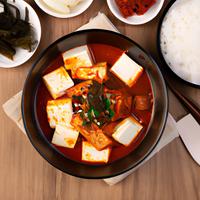
1 serving (400 grams) contains 350 calories, 15.0 grams of protein, 25.0 grams of fat, and 20.0 grams of carbohydrates.

Log this food in SnapCalorie

Nutrition Information
Calories |
207.1 | ||
|---|---|---|---|
% Daily Value* |
|||
| Total Fat | 14.8 g | 18% | |
| Saturated Fat | 4.7 g | 23% | |
| Polyunsaturated Fat | 0 g | ||
| Cholesterol | 29.6 mg | 9% | |
| Sodium | 710.1 mg | 30% | |
| Total Carbohydrates | 11.8 g | 4% | |
| Dietary Fiber | 1.8 g | 6% | |
| Sugars | 3.0 g | ||
| protein | 8.9 g | 17% | |
| Vitamin D | 0 mcg | 0% | |
| Calcium | 59.2 mg | 4% | |
| Iron | 1.2 mg | 6% | |
| Potassium | 236.7 mg | 5% | |
* Percent Daily Values are based on a 2,000 calorie diet. Your daily values may be higher or lower depending on your calorie needs.
Food Attributes
Source of Calories
About Kimchi jiggae with pork belly and tofu
Kimchi Jjigae with Pork Belly and Tofu is a vibrant, hearty Korean stew that highlights the bold flavors of fermented kimchi alongside tender pork belly and silky tofu. Rooted in traditional Korean cuisine, this dish is beloved for its spicy, tangy, and savory profile. Common ingredients include aged kimchi, pork belly, tofu, scallions, garlic, chili paste (gochujang), and broth, often made with anchovies or kelp for added depth. Nutritionally, kimchi contributes probiotics that support gut health and vitamin C, while tofu offers a plant-based protein source and essential minerals like calcium and iron. However, the dish’s sodium content can be high due to the kimchi and seasoning, and pork belly contributes saturated fat, which should be enjoyed in moderation. A balanced serving can provide warmth and nutrition, reflecting the heartiness and health-conscious elements of Korean cooking.



